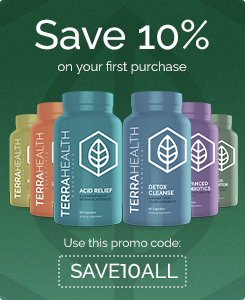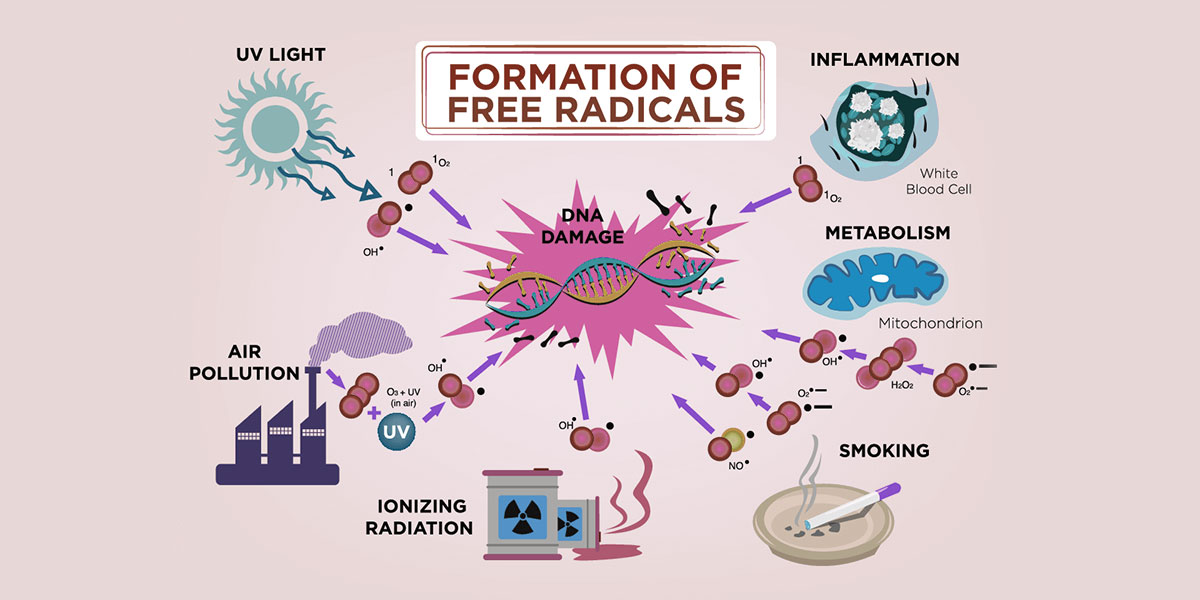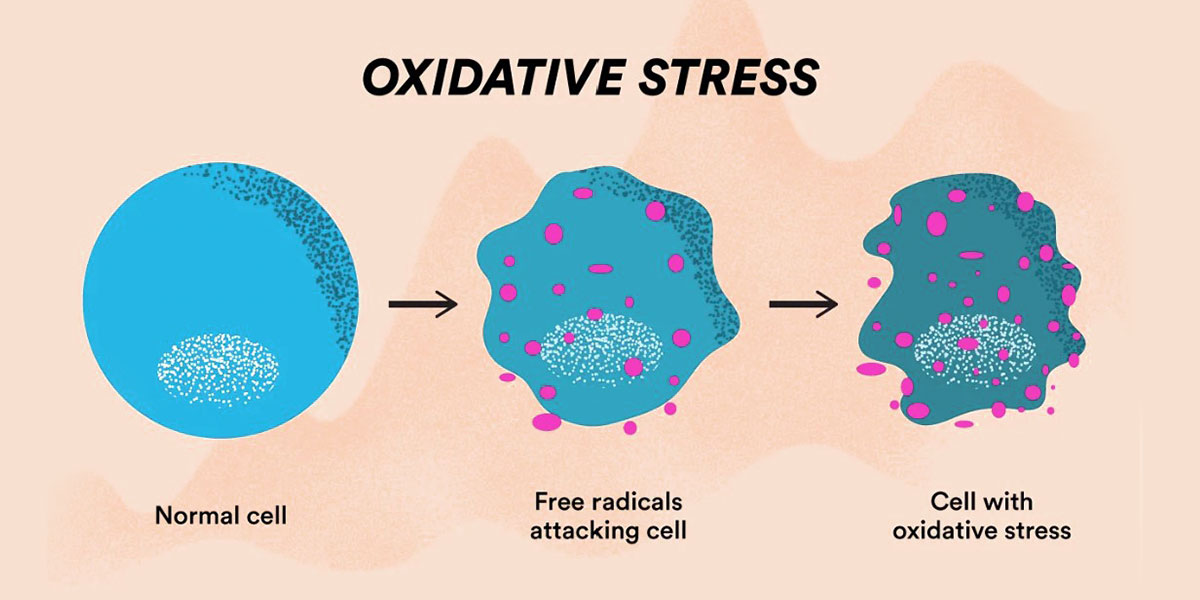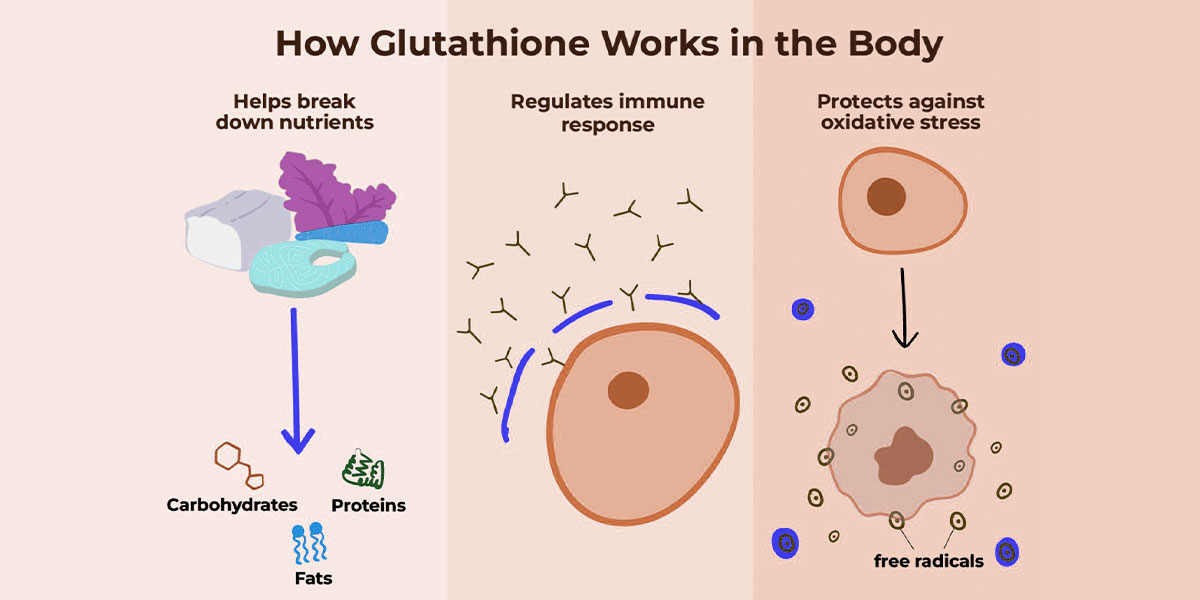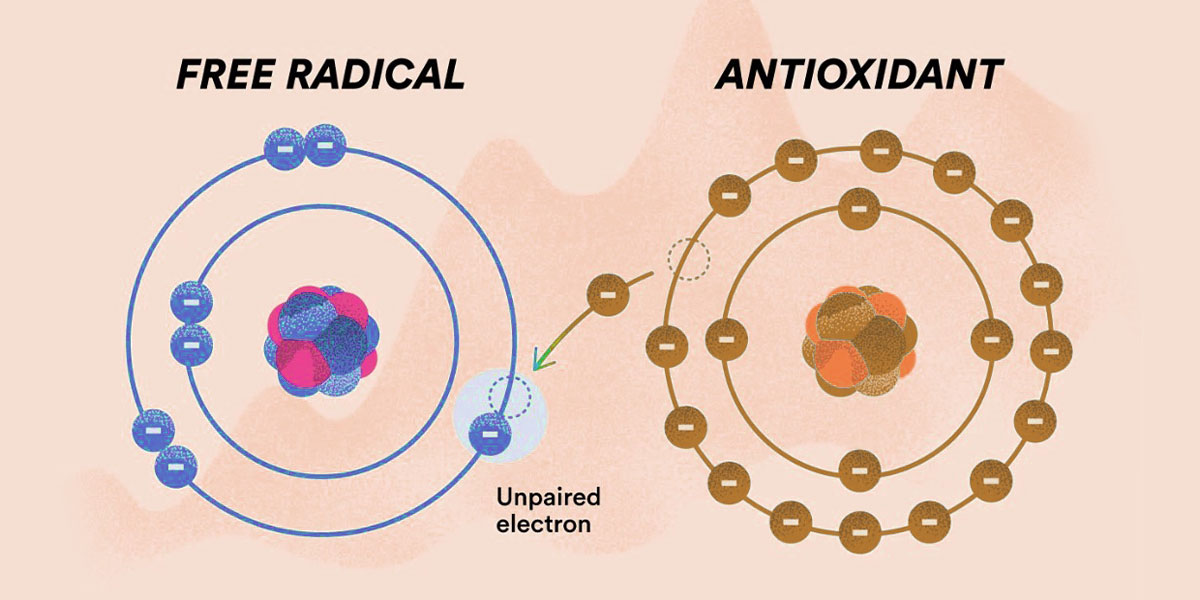The Importance of Antioxidants and the Consequences of Free Radicals
Antioxidants have been a buzzword in the health and wellness community for some time now, and for good reason. Your body’s cells face threats every day – not only from external threats like viruses and infections, but also from the byproducts of cellular functions called free radicals, which can damage your cells and DNA, causing premature aging and increased chance of disease.
Free radicals are a type of unstable molecule that are made during normal cell metabolism (chemical changes that take place in a cell). Free radicals can build up in cells and cause damage to other molecules, such as DNA, lipids, and proteins, they also may play a part in certain health conditions, like cancer, diabetes, and heart disease. Scientists believe these free radical molecules can contribute to the aging process.
Free radicals are a type of unstable molecule that are made during normal cell metabolism (chemical changes that take place in a cell). Free radicals can build up in cells and cause damage to other molecules, such as DNA, lipids, and proteins, they also may play a part in certain health conditions, like cancer, diabetes, and heart disease. Scientists believe these free radical molecules can contribute to the aging process.
The Vital Role of Antioxidants
Antioxidants are molecules that fight off these free radicals (the unstable atoms that can harm cells, leading to various diseases and aging). Your body uses antioxidants to balance free radicals, this keeps them from causing excessive damage to other cells. Our bodies generate some natural antioxidants, known as endogenous antioxidants, but we also need to consume exogenous antioxidants from our diet to keep a healthy balance and compensate for low levels caused through exposure to environmental factors such as tobacco smoke, pollution and radiation.
When an overload of free radicals cannot gradually be destroyed, their accumulation in the body generates a phenomenon called oxidative stress. This stress plays a pivotal role in the development of chronic and degenerative ailments such as heart and liver disease, cancer, disorders related to inflammation, and even accelerated aging.
Antioxidants act as a defensive army, neutralizing free radicals by giving them the electron they’re missing, which prevents the free radicals from taking an electron from our cells. In essence, antioxidants prevent our cells from being burglarized by the free radicals.
Glutathione: The Master Antioxidant and Its Role in Health
As we delve into the world of antioxidants, one particular molecule stands out – Glutathione. Often referred to as the ‘Master Antioxidant,’ Glutathione’s importance to our health and well-being cannot be understated.
Glutathione, a tripeptide composed of three amino acids – cysteine, glutamate, and glycine – is a powerful antioxidant found in every cell of our body. Antioxidants are substances that neutralize harmful free radicals, unstable molecules that can damage cells and contribute to aging and disease.
As the ‘Master Antioxidant,’ Glutathione takes on multiple essential roles within our bodies. Its primary function is to neutralize free radicals and detoxify harmful substances in the body, but it also plays a critical role in recycling other antioxidants, regulating the immune system, and preventing damage to important cellular components.
Glutathione is unique because, unlike most antioxidants, it operates within the cell, giving it a front-line position in protecting the cell from oxidative stress. It also has the capability to regenerate itself and ‘reactivate’ other antioxidants, like vitamins C and E, making it a crucial player in our body’s antioxidant defense system.
Glutathione, a tripeptide composed of three amino acids – cysteine, glutamate, and glycine – is a powerful antioxidant found in every cell of our body. Antioxidants are substances that neutralize harmful free radicals, unstable molecules that can damage cells and contribute to aging and disease.
As the ‘Master Antioxidant,’ Glutathione takes on multiple essential roles within our bodies. Its primary function is to neutralize free radicals and detoxify harmful substances in the body, but it also plays a critical role in recycling other antioxidants, regulating the immune system, and preventing damage to important cellular components.
Glutathione is unique because, unlike most antioxidants, it operates within the cell, giving it a front-line position in protecting the cell from oxidative stress. It also has the capability to regenerate itself and ‘reactivate’ other antioxidants, like vitamins C and E, making it a crucial player in our body’s antioxidant defense system.
Low Glutathione Levels: A Threat to Health
While our bodies naturally produce Glutathione, factors like poor nutrition, chronic stress, aging, and infections can deplete our Glutathione levels. This can lead to an increase in oxidative stress and a decrease in the body’s ability to detoxify, potentially leading to various health problems.
Low levels of Glutathione can result in increased susceptibility to oxidative stress, which can manifest in several ways, from fatigue and brain fog to visible signs of aging like wrinkles and grey hair. More severe health issues can arise too, like a weakened immune system and an increased risk of chronic diseases.
Studies suggest that low Glutathione levels might also be linked to many age-related health conditions, like Alzheimer’s disease, macular degeneration, and many others. Therefore, maintaining optimal Glutathione levels is critical for preserving health and preventing disease.
Low levels of Glutathione can result in increased susceptibility to oxidative stress, which can manifest in several ways, from fatigue and brain fog to visible signs of aging like wrinkles and grey hair. More severe health issues can arise too, like a weakened immune system and an increased risk of chronic diseases.
Studies suggest that low Glutathione levels might also be linked to many age-related health conditions, like Alzheimer’s disease, macular degeneration, and many others. Therefore, maintaining optimal Glutathione levels is critical for preserving health and preventing disease.
Boosting Glutathione Levels for Optimal Health
There are several ways to boost Glutathione levels. Consuming a diet rich in sulfur-containing foods like garlic, onions, and cruciferous vegetables can help. Other nutrients like selenium, found in Brazil nuts and fish, and vitamins C and E, found in fruits and vegetables, also support Glutathione production.
Supplementation can also be a beneficial way to increase Glutathione levels. However, Not all glutathione supplements are created equal, Terra Health Essentials’ Liposomal Glutathione supplement stands head and shoulders above non-liposomal supplements due to its enhanced bioavailability. The liposomal encapsulation technology, which involves wrapping the glutathione molecules in a layer of fat, allows for superior absorption and delivery directly into the cells.
This means your body can use more of the glutathione compared to traditional, non-liposomal supplements. As a result, you enjoy the full benefits of this powerful antioxidant at a faster rate, including improved detoxification, immune support, and cellular health. This makes Terra Health Essentials’ Liposomal Glutathione a superior choice for those seeking an effective glutathione supplement.
Supplementation can also be a beneficial way to increase Glutathione levels. However, Not all glutathione supplements are created equal, Terra Health Essentials’ Liposomal Glutathione supplement stands head and shoulders above non-liposomal supplements due to its enhanced bioavailability. The liposomal encapsulation technology, which involves wrapping the glutathione molecules in a layer of fat, allows for superior absorption and delivery directly into the cells.
This means your body can use more of the glutathione compared to traditional, non-liposomal supplements. As a result, you enjoy the full benefits of this powerful antioxidant at a faster rate, including improved detoxification, immune support, and cellular health. This makes Terra Health Essentials’ Liposomal Glutathione a superior choice for those seeking an effective glutathione supplement.
Click here to claim your 10% OFF
coupon on Liposomal Glutathione.
Use Coupon Code: LIPO10
*Coupon expires on: September 6, 2023

